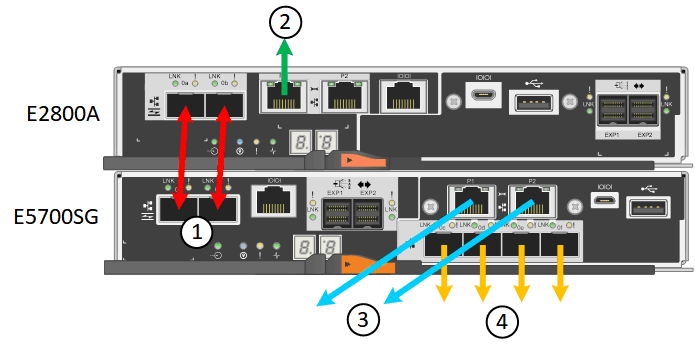Review appliance network connections (SG5700)
 Suggest changes
Suggest changes


Before installing the StorageGRID appliance, you should understand which networks can be connected to the appliance and how the ports on each controller are used.
StorageGRID appliance networks
When you deploy a StorageGRID appliance as a Storage Node in a StorageGRID grid, you can connect it to the following networks:
-
Grid Network for StorageGRID: The Grid Network is used for all internal StorageGRID traffic. It provides connectivity between all nodes in the grid, across all sites and subnets. The Grid Network is required.
-
Admin Network for StorageGRID: The Admin Network is a closed network used for system administration and maintenance. The Admin Network is typically a private network and does not need to be routable between sites. The Admin Network is optional.
-
Client Network for StorageGRID: The Client Network is an open network used to provide access to client applications, including S3 and Swift. The Client Network provides client protocol access to the grid, so the Grid Network can be isolated and secured. The Client Network is optional.
-
Management network for SANtricity System Manager (optional): This network provides access to SANtricity System Manager on the E2800 controller, allowing you to monitor and manage the hardware components in the appliance. This management network can be the same as the Admin Network for StorageGRID, or it can be an independent management network.
If the optional SANtricity System Manager network is not connected, you might be unable to use some SANtricity features.

|
For detailed information about StorageGRID networks, see the Grid Primer. |
StorageGRID appliance connections
When you install a StorageGRID appliance, you must connect the two controllers to each other and to the required networks. The figure shows the two controllers in the SG5760, with the E2800 controller on the top and the E5700SG controller on the bottom. In the SG5712, the E2800 controller is to the left of the E5700SG controller.

| Port | Type of port | Function | |
|---|---|---|---|
1 |
Two interconnect ports on each controller |
16Gb/s FC optical SFP+ |
Connect the two controllers to each other. |
2 |
Management port 1 on the E2800 controller |
1-GbE (RJ-45) |
Connects to the network where you access SANtricity System Manager. You can use the Admin Network for StorageGRID or an independent management network. |
2 |
Management port 2 on the E2800 controller |
1-GbE (RJ-45) |
Reserved for technical support. |
3 |
Management port 1 on the E5700SG controller |
1-GbE (RJ-45) |
Connects the E5700SG controller to the Admin Network for StorageGRID. |
3 |
Management port 2 on the E5700SG controller |
1-GbE (RJ-45) |
|
4 |
10/25-GbE ports 1-4 on the E5700SG controller |
10-GbE or 25-GbE Note: The SFP+ transceivers included with the appliance support 10-GbE link speeds. If you want to use 25-GbE link speeds for the four network ports, you must provide SFP28 transceivers. |
Connect to the Grid Network and the Client Network for StorageGRID. See “10/25-GbE port connections for the E5700SG controller.” |


